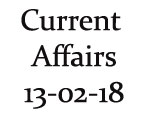-
Current Affairs 13th February 2018
Updated : 13-Feb-2018
Current Affairs 13th February 2018 - Important Points
- Which Indian City is 12th richest city globally – Mumbai
- PM Modi lays foundation stone of first Hindu temple in - Abu Dhabi
- ONGC acquires 10 per cent stake in which company of UAE - Zakum oilfield
- Independent debt management office must be set up - NITI Aayog
- Which Government bans sale of loose cigarettes - Bihar Government
Current Affairs 13th February 2018 - Details
Which Indian City is 12th richest city globally – Mumbai
India’s financial capital Mumbai, was ranked 12th richest city globally, with a total wealth of US $950 billion, in the report issued by New World Wealth.
In the report, total wealth refers to the private revenue retained by all individuals living in every city. It consists all their assets of cash, property, business, equities, interests and many more, less any debt. Government funds are eliminated from it.
Key Points
The list of fifteen wealthiest cities was crowned by New York with complete wealth of US $ three trillion due to home for the 2 largest stock exchanges in the world. London was placed 2nd $2.7 trillion followed by Tokyo third, $2.5 trillion, San Francisco Bay area fourth, $2.3 trillion, Beijing fifth, $2.2 trillion, Shanghai sixth, $2 trillion, Los Angeles seventh, $1.4 trillion, Hong Kong eighth, $1.3 trillion, Sydney ninth, $1 trillion, Singapore tenth, $1 trillion and Chicago eleventh, $988 billion, Toronto thirteenth, $944 billion, Frankfurt fourteenth, $912 billion and Paris fifteenth, $860 billion.
As per the report, Mumbai is economic core of India. It is home to Bombay Stock Exchange, the 12th largest stock exchange in the world. It is the habitation for major industries including financial services, media and real estate. It is believed to be the fastest growing city. Mumbai is home to 28 billionaires, individuals with US $1 billion or more in net worth.
PM Modi lays foundation stone of first Hindu temple in - Abu Dhabi
Prime Minister Narendra Modi laid the foundation stone for the building of 1st traditional Hindu temple in Al Wathba, Abu Dhabi, UAE. The UAE government had alloted land for the temple during PM Modi’s 1st visit to the gulf nation in 2015.
Key Points
It will be the 1st traditional Hindu stone temple in the Middle East. The temple outline and structure is in the line of the Akshardham temples in India. It will be build on 55,000 square metres of land. It will consist idols of Lord Krishna, Lord Ayyappa, Lord Maheshwara and more.
It will include all visible manners and looks of a traditional Hindu temple as part of complete social, cultural, functional and spiritual multiform. It will be carved by Indian temple artisans and put together in UAE. It also will have a garden and a water-front. It will be finished by 2020 and will be ready for people of all religions.
ONGC acquires 10 per cent stake in which company of UAE - Zakum oilfield
Oil and Natural Gas Corporation led consortium of Indian state oil organisations have gained 10 percent stake in Abu Dhabi’s offshore Lower Zakum Concession for $600 million.
The achievement is part of deal signed between company representatives and UAE officials witnessed by visiting Prime Minister Narendra Modi and Abu Dhabi crown prince Sheikh Mohammed bin Zayed Al Nahyan in Abu Dhabi.
Key Points
The Lower Zakum Oil Field is situated 84 kilometres north-west of Abu Dhabi Islands. It was found in 1963 and is owned and grown by Abu Dhabi National Oil Company. The total proven stocks of it are approximately 17.2 billion barrels and generation is 425,000 barrels each day.
With this accordance, Indian oil and gas companies for 1st time have gained stake in development of Abu Dhabi’s hydrocarbon resources. The accordance gives monopoly of Indian oil companies consisting of Indian Oil Corp. Ltd and Bharat Petroleum Corp. Ltd’s foreign branch Bharat PetroResources Ltd, access to approximate 2 million tonnes of yearly share from field. The accordance has term of 40 years. It will aid India to meet its increasing requirement for future energy and refined products.
Background
Due to decreased and fall in global oil prices, oil-rich countries had recourse the ways of decreasing risk and managing their budget deficits by selling their prime oil and gas valuables and altering into non-oil areas of economy. Indian energy organisations have been aggressively trying to gain share in these most productive oil and gas fields sold by oil-rich countries.
Independent debt management office must be set up - NITI Aayog
NITI Aayog has formed strong case for establishing independent Debt Management Office for improved loan servicing that will edge to substantial decrease in India’s interest payment.
Presently, government debt is handled by Reserve Bank of India. Establishing independent Debt Management Office will assist to solve issues concerned to conflict of interest as RBI finalises on important interest vaues as well as undertakes purchasing and selling of government bonds.
Importance
The establishment of Debt Management Office has been the prime concern of government for delivering reforms in financial division. It will dispose RBI of its dual and conflicting roles as banker and manager of Central Government’s borrowing.
It will also help in better outline and management of local and international market loans of Central Government. It will also assist in strengthen bond market and facilitate to promote investment. It will be in pursuance global exercise of transferring public debt management from central bank to a debt administration office.
Which Government bans sale of loose cigarettes - Bihar Government
Bihar Government has restricted sale of loose cigarettes in the state. This provision focuses to be deterrent to kids and youth, who initiate smoking by purchasing loose cigarettes. In this regard, state health department has released notification under Section 20 of Cigarettes and Other Tobacco Products Act- COTPA, 2003. Bihar is the 12th state in the nation to bring such a restriction into effect after Rajasthan, Himachal Pradesh, Uttarakhand, Punjab, Delhi and others.
Key Points
Section 20 of Cigarettes and Other Tobacco Products Act, 2003 makes sale, trading, purchase and advertisement of tobacco products without important pictorial warnings, is a punishable offence. Because, the loose cigarettes do not have pictorial threats, thus its sale, trading, purchase and advertisement is restricted under Cigarettes and Other Tobacco Products Act, 2003.
According to Global Adults Tobacco Survey, 53.5 percent adults use tobacco in one or another form in Bihar while 9 percent of this 53.5 percent are dependent on cigarette. Large state population is addicted to lose cigarettes, consisting teenagers. The provision of restricting sale of loose cigarettes will safeguard children from cigarette usage as kids and teenagers are not capable to purchase the complete pack, however, opt for loose cigarettes.
Cigarettes and Other Tobacco Products Act, 2003
It is an Act of Parliament executed in 2003 to block advertisement of and to provide for regulation of sale and commerce in and manufacturing, supply and delivery of cigarettes and other tobacco products in India.














